Organisational Behaviour Report: BBC Culture, Motivation and Teams
VerifiedAdded on 2020/06/05
|13
|4049
|510
Report
AI Summary
This report provides a comprehensive analysis of the organizational behavior within the British Broadcasting Corporation (BBC). It begins by examining BBC's organizational culture through the lens of Handy's cultural typology, assessing the impact of power, culture, and politics on the organization's functioning. The report delves into motivational theories, including Maslow's Hierarchy, Hertzberg's theory, and the Three-Dimensional Theory, and suggests motivational techniques to enhance employee efficiency. Furthermore, it explores the significance of teams within BBC, evaluating their effectiveness and identifying barriers to improved performance. The report concludes by emphasizing the importance of implementing motivational strategies to foster employee dedication, satisfaction, and overall organizational growth. The report highlights the significance of organizational behavior in determining plans, employer-employee interactions, health and safety and maintaining stability in business which assists the firm in its growth and development.
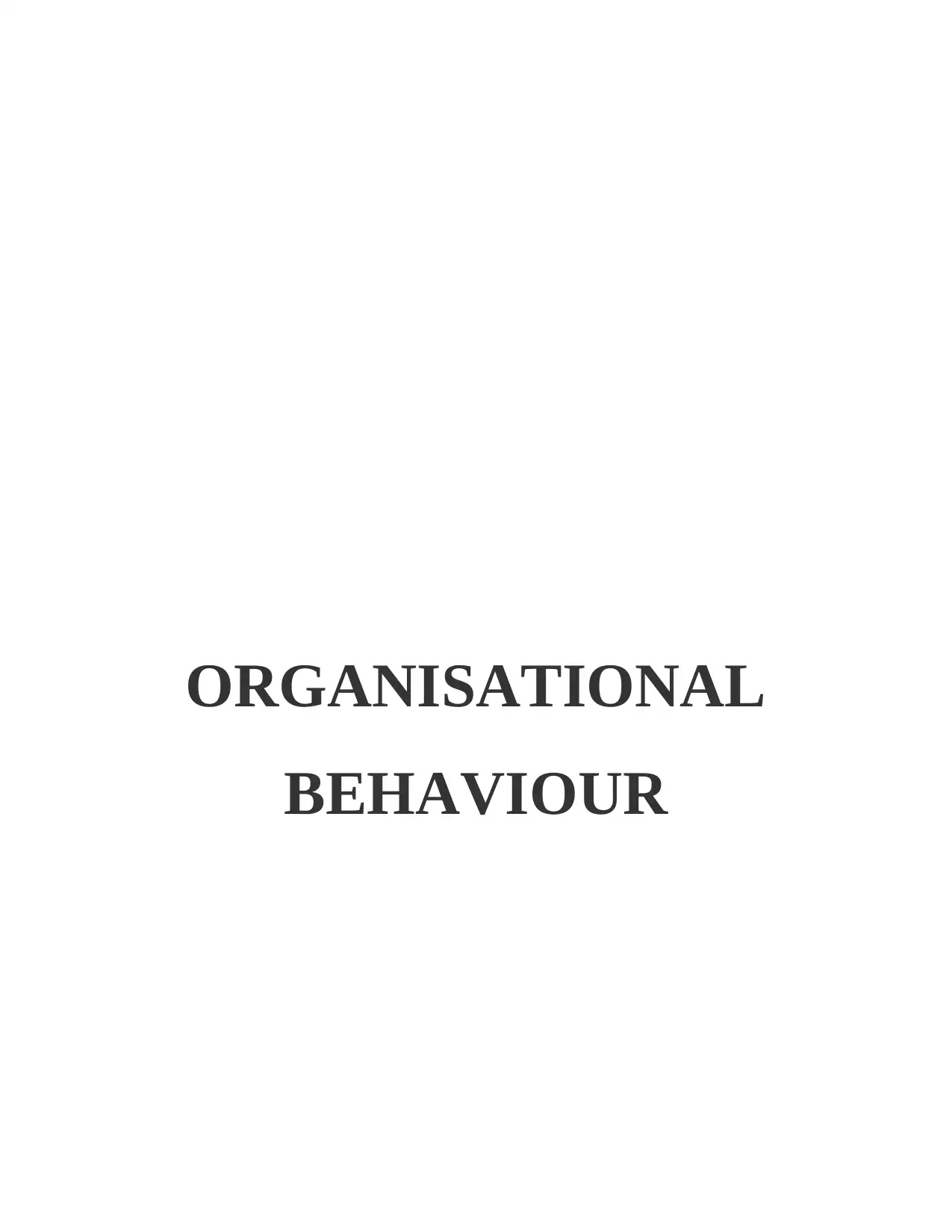
ORGANISATIONAL
BEHAVIOUR
BEHAVIOUR
Paraphrase This Document
Need a fresh take? Get an instant paraphrase of this document with our AI Paraphraser
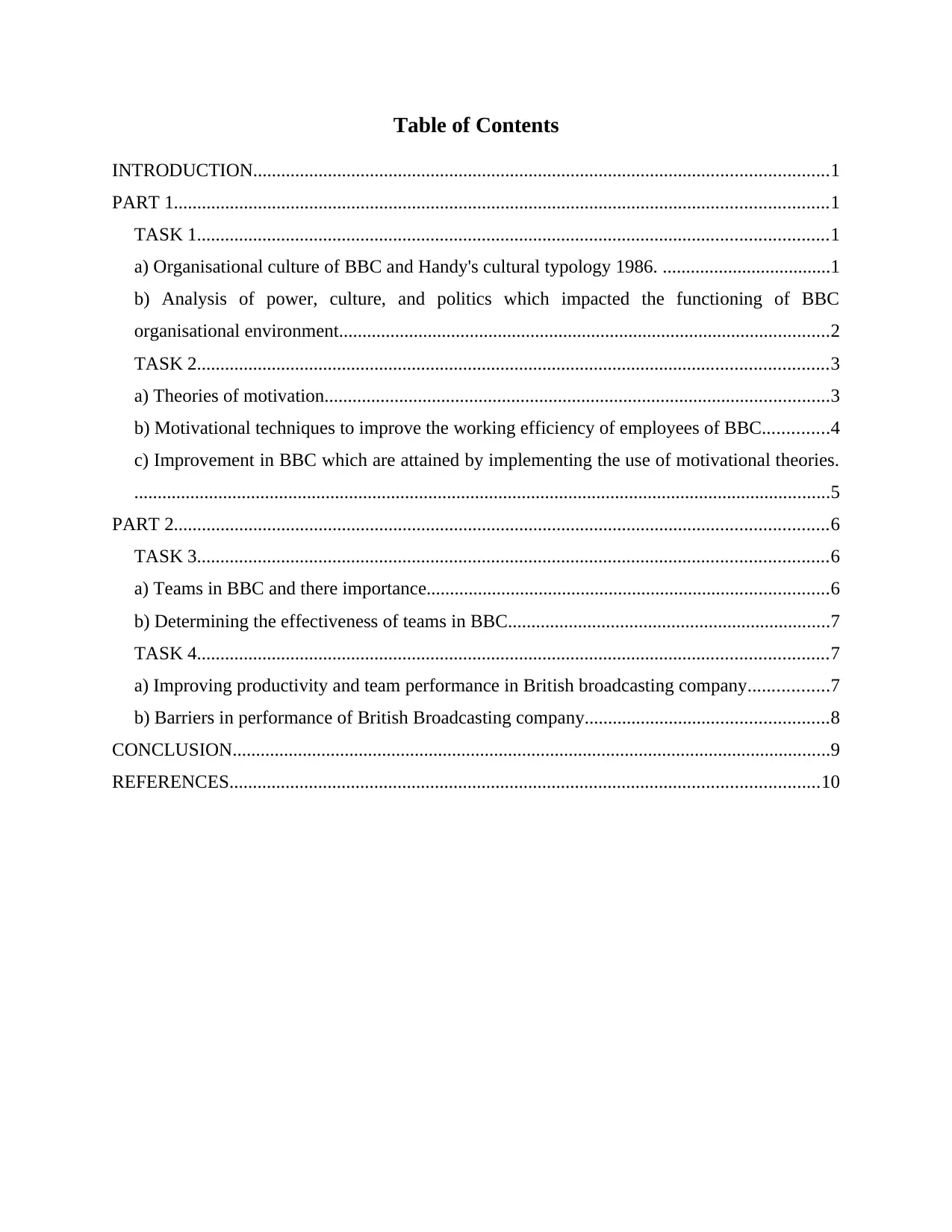
Table of Contents
INTRODUCTION...........................................................................................................................1
PART 1............................................................................................................................................1
TASK 1.......................................................................................................................................1
a) Organisational culture of BBC and Handy's cultural typology 1986. ....................................1
b) Analysis of power, culture, and politics which impacted the functioning of BBC
organisational environment.........................................................................................................2
TASK 2.......................................................................................................................................3
a) Theories of motivation............................................................................................................3
b) Motivational techniques to improve the working efficiency of employees of BBC..............4
c) Improvement in BBC which are attained by implementing the use of motivational theories.
.....................................................................................................................................................5
PART 2............................................................................................................................................6
TASK 3.......................................................................................................................................6
a) Teams in BBC and there importance......................................................................................6
b) Determining the effectiveness of teams in BBC.....................................................................7
TASK 4.......................................................................................................................................7
a) Improving productivity and team performance in British broadcasting company.................7
b) Barriers in performance of British Broadcasting company....................................................8
CONCLUSION................................................................................................................................9
REFERENCES..............................................................................................................................10
INTRODUCTION...........................................................................................................................1
PART 1............................................................................................................................................1
TASK 1.......................................................................................................................................1
a) Organisational culture of BBC and Handy's cultural typology 1986. ....................................1
b) Analysis of power, culture, and politics which impacted the functioning of BBC
organisational environment.........................................................................................................2
TASK 2.......................................................................................................................................3
a) Theories of motivation............................................................................................................3
b) Motivational techniques to improve the working efficiency of employees of BBC..............4
c) Improvement in BBC which are attained by implementing the use of motivational theories.
.....................................................................................................................................................5
PART 2............................................................................................................................................6
TASK 3.......................................................................................................................................6
a) Teams in BBC and there importance......................................................................................6
b) Determining the effectiveness of teams in BBC.....................................................................7
TASK 4.......................................................................................................................................7
a) Improving productivity and team performance in British broadcasting company.................7
b) Barriers in performance of British Broadcasting company....................................................8
CONCLUSION................................................................................................................................9
REFERENCES..............................................................................................................................10
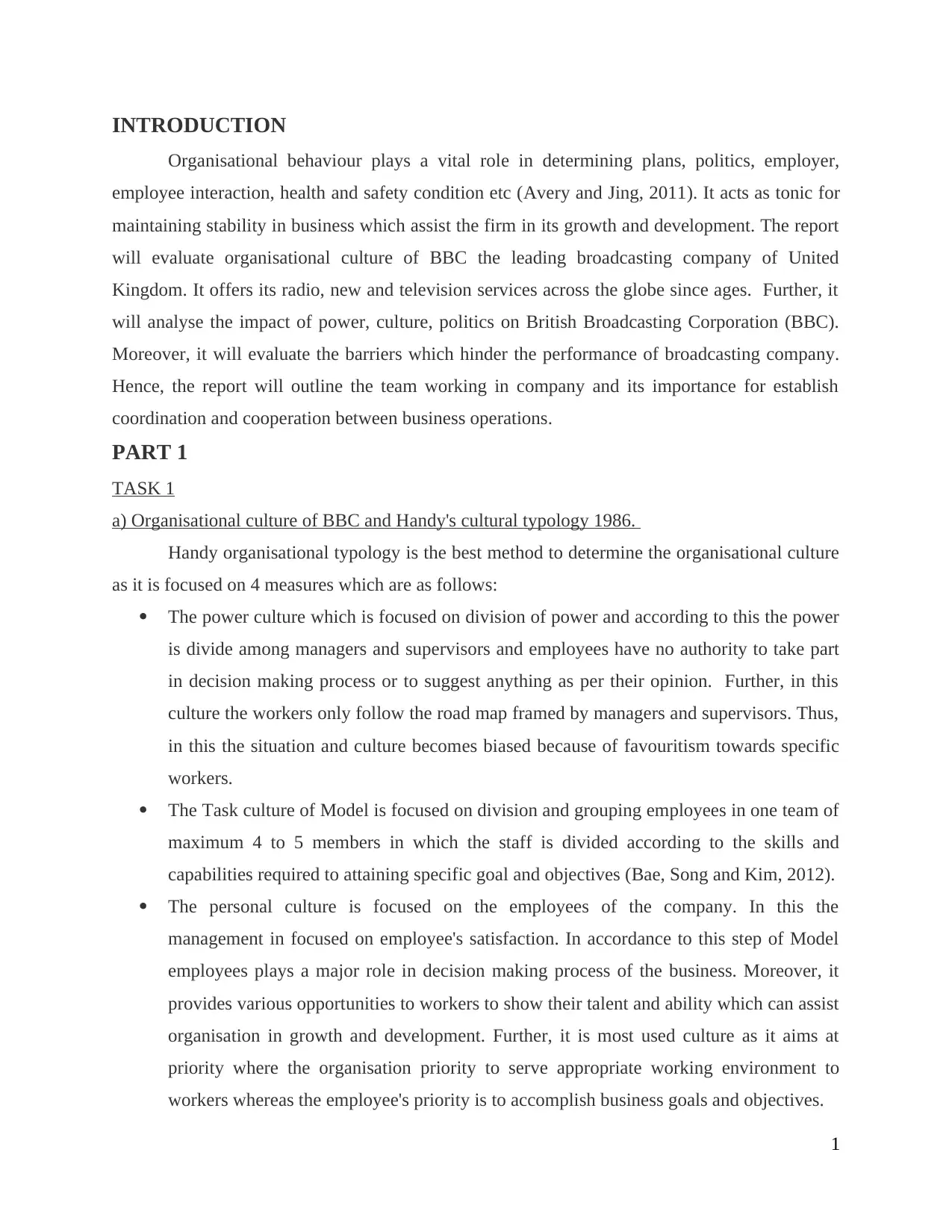
INTRODUCTION
Organisational behaviour plays a vital role in determining plans, politics, employer,
employee interaction, health and safety condition etc (Avery and Jing, 2011). It acts as tonic for
maintaining stability in business which assist the firm in its growth and development. The report
will evaluate organisational culture of BBC the leading broadcasting company of United
Kingdom. It offers its radio, new and television services across the globe since ages. Further, it
will analyse the impact of power, culture, politics on British Broadcasting Corporation (BBC).
Moreover, it will evaluate the barriers which hinder the performance of broadcasting company.
Hence, the report will outline the team working in company and its importance for establish
coordination and cooperation between business operations.
PART 1
TASK 1
a) Organisational culture of BBC and Handy's cultural typology 1986.
Handy organisational typology is the best method to determine the organisational culture
as it is focused on 4 measures which are as follows:
The power culture which is focused on division of power and according to this the power
is divide among managers and supervisors and employees have no authority to take part
in decision making process or to suggest anything as per their opinion. Further, in this
culture the workers only follow the road map framed by managers and supervisors. Thus,
in this the situation and culture becomes biased because of favouritism towards specific
workers.
The Task culture of Model is focused on division and grouping employees in one team of
maximum 4 to 5 members in which the staff is divided according to the skills and
capabilities required to attaining specific goal and objectives (Bae, Song and Kim, 2012).
The personal culture is focused on the employees of the company. In this the
management in focused on employee's satisfaction. In accordance to this step of Model
employees plays a major role in decision making process of the business. Moreover, it
provides various opportunities to workers to show their talent and ability which can assist
organisation in growth and development. Further, it is most used culture as it aims at
priority where the organisation priority to serve appropriate working environment to
workers whereas the employee's priority is to accomplish business goals and objectives.
1
Organisational behaviour plays a vital role in determining plans, politics, employer,
employee interaction, health and safety condition etc (Avery and Jing, 2011). It acts as tonic for
maintaining stability in business which assist the firm in its growth and development. The report
will evaluate organisational culture of BBC the leading broadcasting company of United
Kingdom. It offers its radio, new and television services across the globe since ages. Further, it
will analyse the impact of power, culture, politics on British Broadcasting Corporation (BBC).
Moreover, it will evaluate the barriers which hinder the performance of broadcasting company.
Hence, the report will outline the team working in company and its importance for establish
coordination and cooperation between business operations.
PART 1
TASK 1
a) Organisational culture of BBC and Handy's cultural typology 1986.
Handy organisational typology is the best method to determine the organisational culture
as it is focused on 4 measures which are as follows:
The power culture which is focused on division of power and according to this the power
is divide among managers and supervisors and employees have no authority to take part
in decision making process or to suggest anything as per their opinion. Further, in this
culture the workers only follow the road map framed by managers and supervisors. Thus,
in this the situation and culture becomes biased because of favouritism towards specific
workers.
The Task culture of Model is focused on division and grouping employees in one team of
maximum 4 to 5 members in which the staff is divided according to the skills and
capabilities required to attaining specific goal and objectives (Bae, Song and Kim, 2012).
The personal culture is focused on the employees of the company. In this the
management in focused on employee's satisfaction. In accordance to this step of Model
employees plays a major role in decision making process of the business. Moreover, it
provides various opportunities to workers to show their talent and ability which can assist
organisation in growth and development. Further, it is most used culture as it aims at
priority where the organisation priority to serve appropriate working environment to
workers whereas the employee's priority is to accomplish business goals and objectives.
1
⊘ This is a preview!⊘
Do you want full access?
Subscribe today to unlock all pages.

Trusted by 1+ million students worldwide
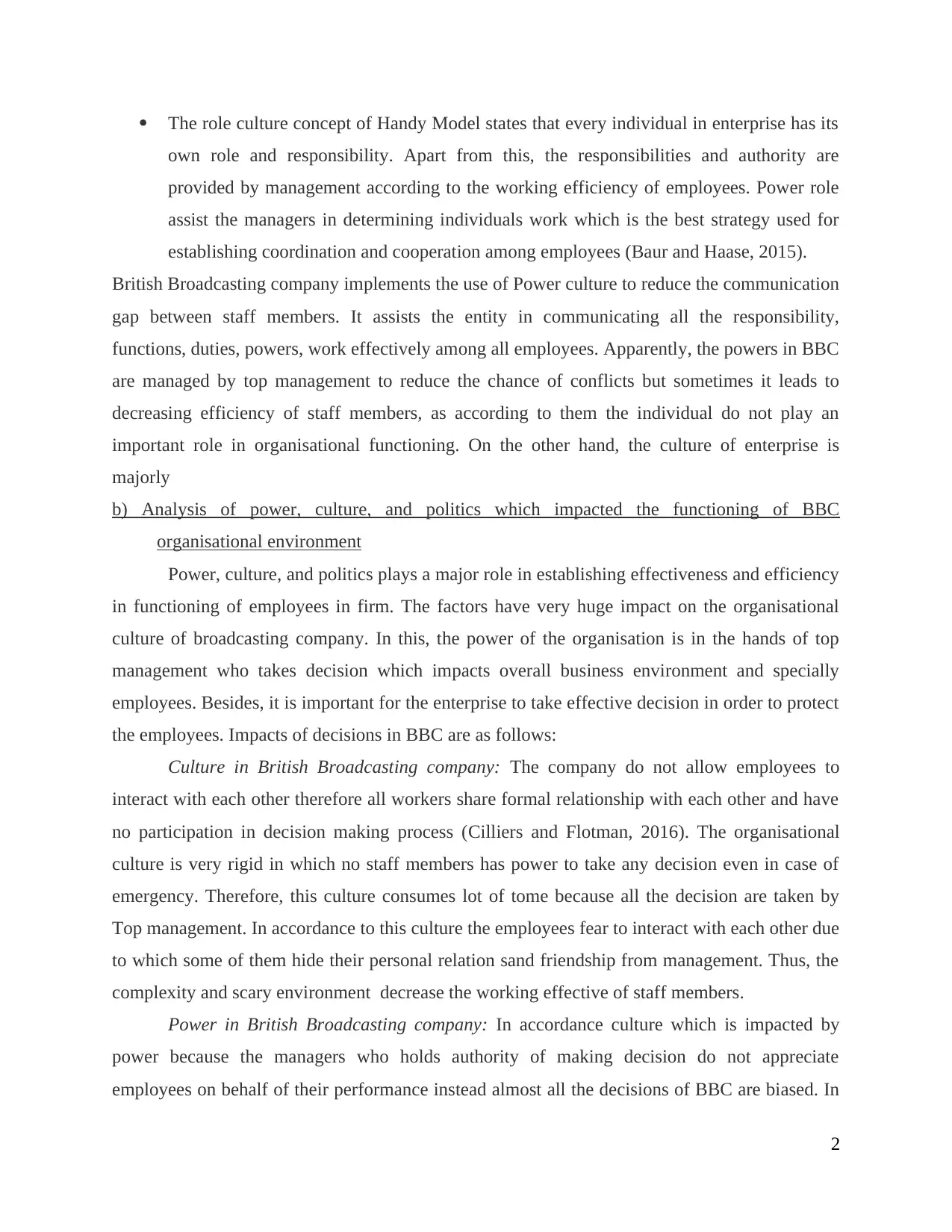
The role culture concept of Handy Model states that every individual in enterprise has its
own role and responsibility. Apart from this, the responsibilities and authority are
provided by management according to the working efficiency of employees. Power role
assist the managers in determining individuals work which is the best strategy used for
establishing coordination and cooperation among employees (Baur and Haase, 2015).
British Broadcasting company implements the use of Power culture to reduce the communication
gap between staff members. It assists the entity in communicating all the responsibility,
functions, duties, powers, work effectively among all employees. Apparently, the powers in BBC
are managed by top management to reduce the chance of conflicts but sometimes it leads to
decreasing efficiency of staff members, as according to them the individual do not play an
important role in organisational functioning. On the other hand, the culture of enterprise is
majorly
b) Analysis of power, culture, and politics which impacted the functioning of BBC
organisational environment
Power, culture, and politics plays a major role in establishing effectiveness and efficiency
in functioning of employees in firm. The factors have very huge impact on the organisational
culture of broadcasting company. In this, the power of the organisation is in the hands of top
management who takes decision which impacts overall business environment and specially
employees. Besides, it is important for the enterprise to take effective decision in order to protect
the employees. Impacts of decisions in BBC are as follows:
Culture in British Broadcasting company: The company do not allow employees to
interact with each other therefore all workers share formal relationship with each other and have
no participation in decision making process (Cilliers and Flotman, 2016). The organisational
culture is very rigid in which no staff members has power to take any decision even in case of
emergency. Therefore, this culture consumes lot of tome because all the decision are taken by
Top management. In accordance to this culture the employees fear to interact with each other due
to which some of them hide their personal relation sand friendship from management. Thus, the
complexity and scary environment decrease the working effective of staff members.
Power in British Broadcasting company: In accordance culture which is impacted by
power because the managers who holds authority of making decision do not appreciate
employees on behalf of their performance instead almost all the decisions of BBC are biased. In
2
own role and responsibility. Apart from this, the responsibilities and authority are
provided by management according to the working efficiency of employees. Power role
assist the managers in determining individuals work which is the best strategy used for
establishing coordination and cooperation among employees (Baur and Haase, 2015).
British Broadcasting company implements the use of Power culture to reduce the communication
gap between staff members. It assists the entity in communicating all the responsibility,
functions, duties, powers, work effectively among all employees. Apparently, the powers in BBC
are managed by top management to reduce the chance of conflicts but sometimes it leads to
decreasing efficiency of staff members, as according to them the individual do not play an
important role in organisational functioning. On the other hand, the culture of enterprise is
majorly
b) Analysis of power, culture, and politics which impacted the functioning of BBC
organisational environment
Power, culture, and politics plays a major role in establishing effectiveness and efficiency
in functioning of employees in firm. The factors have very huge impact on the organisational
culture of broadcasting company. In this, the power of the organisation is in the hands of top
management who takes decision which impacts overall business environment and specially
employees. Besides, it is important for the enterprise to take effective decision in order to protect
the employees. Impacts of decisions in BBC are as follows:
Culture in British Broadcasting company: The company do not allow employees to
interact with each other therefore all workers share formal relationship with each other and have
no participation in decision making process (Cilliers and Flotman, 2016). The organisational
culture is very rigid in which no staff members has power to take any decision even in case of
emergency. Therefore, this culture consumes lot of tome because all the decision are taken by
Top management. In accordance to this culture the employees fear to interact with each other due
to which some of them hide their personal relation sand friendship from management. Thus, the
complexity and scary environment decrease the working effective of staff members.
Power in British Broadcasting company: In accordance culture which is impacted by
power because the managers who holds authority of making decision do not appreciate
employees on behalf of their performance instead almost all the decisions of BBC are biased. In
2
Paraphrase This Document
Need a fresh take? Get an instant paraphrase of this document with our AI Paraphraser
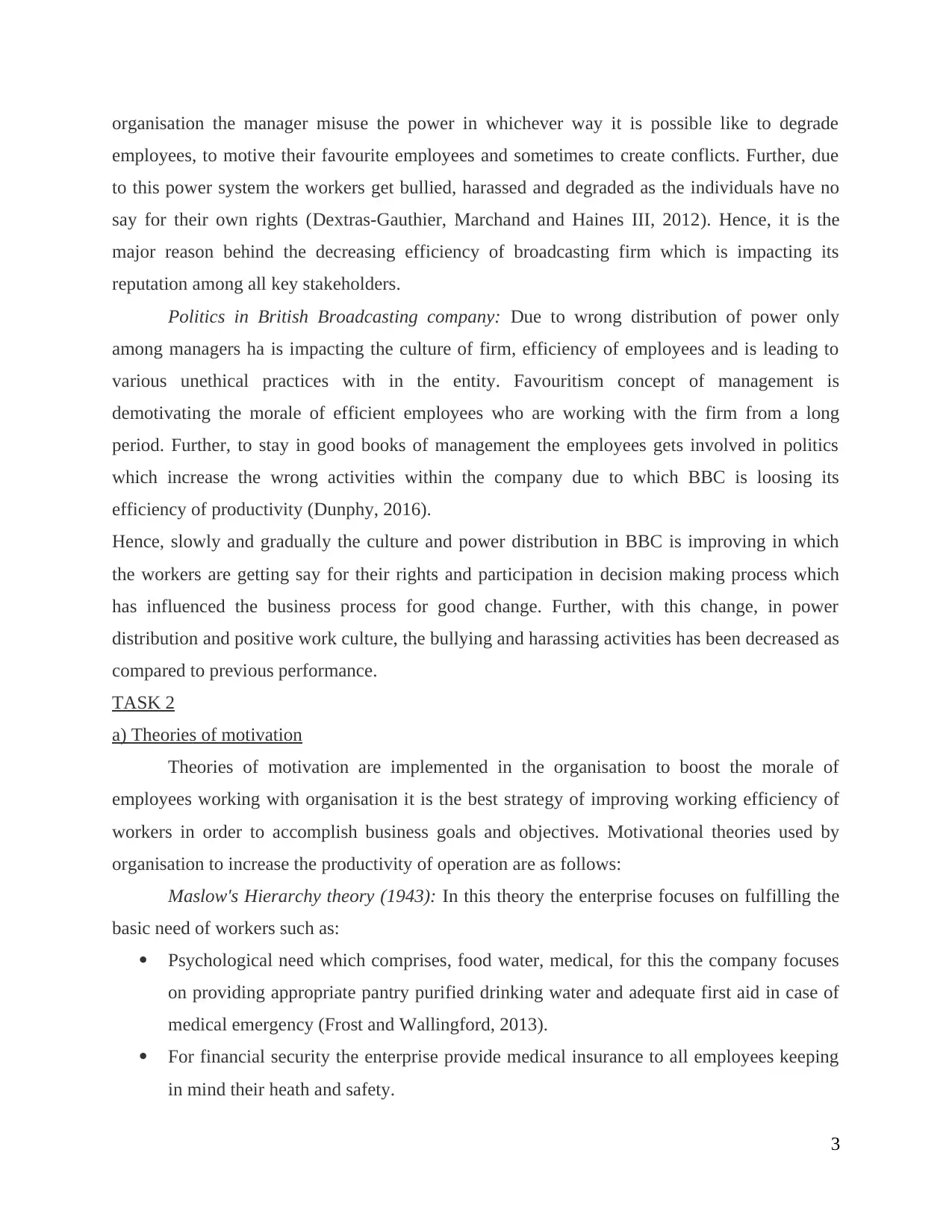
organisation the manager misuse the power in whichever way it is possible like to degrade
employees, to motive their favourite employees and sometimes to create conflicts. Further, due
to this power system the workers get bullied, harassed and degraded as the individuals have no
say for their own rights (Dextras-Gauthier, Marchand and Haines III, 2012). Hence, it is the
major reason behind the decreasing efficiency of broadcasting firm which is impacting its
reputation among all key stakeholders.
Politics in British Broadcasting company: Due to wrong distribution of power only
among managers ha is impacting the culture of firm, efficiency of employees and is leading to
various unethical practices with in the entity. Favouritism concept of management is
demotivating the morale of efficient employees who are working with the firm from a long
period. Further, to stay in good books of management the employees gets involved in politics
which increase the wrong activities within the company due to which BBC is loosing its
efficiency of productivity (Dunphy, 2016).
Hence, slowly and gradually the culture and power distribution in BBC is improving in which
the workers are getting say for their rights and participation in decision making process which
has influenced the business process for good change. Further, with this change, in power
distribution and positive work culture, the bullying and harassing activities has been decreased as
compared to previous performance.
TASK 2
a) Theories of motivation
Theories of motivation are implemented in the organisation to boost the morale of
employees working with organisation it is the best strategy of improving working efficiency of
workers in order to accomplish business goals and objectives. Motivational theories used by
organisation to increase the productivity of operation are as follows:
Maslow's Hierarchy theory (1943): In this theory the enterprise focuses on fulfilling the
basic need of workers such as:
Psychological need which comprises, food water, medical, for this the company focuses
on providing appropriate pantry purified drinking water and adequate first aid in case of
medical emergency (Frost and Wallingford, 2013).
For financial security the enterprise provide medical insurance to all employees keeping
in mind their heath and safety.
3
employees, to motive their favourite employees and sometimes to create conflicts. Further, due
to this power system the workers get bullied, harassed and degraded as the individuals have no
say for their own rights (Dextras-Gauthier, Marchand and Haines III, 2012). Hence, it is the
major reason behind the decreasing efficiency of broadcasting firm which is impacting its
reputation among all key stakeholders.
Politics in British Broadcasting company: Due to wrong distribution of power only
among managers ha is impacting the culture of firm, efficiency of employees and is leading to
various unethical practices with in the entity. Favouritism concept of management is
demotivating the morale of efficient employees who are working with the firm from a long
period. Further, to stay in good books of management the employees gets involved in politics
which increase the wrong activities within the company due to which BBC is loosing its
efficiency of productivity (Dunphy, 2016).
Hence, slowly and gradually the culture and power distribution in BBC is improving in which
the workers are getting say for their rights and participation in decision making process which
has influenced the business process for good change. Further, with this change, in power
distribution and positive work culture, the bullying and harassing activities has been decreased as
compared to previous performance.
TASK 2
a) Theories of motivation
Theories of motivation are implemented in the organisation to boost the morale of
employees working with organisation it is the best strategy of improving working efficiency of
workers in order to accomplish business goals and objectives. Motivational theories used by
organisation to increase the productivity of operation are as follows:
Maslow's Hierarchy theory (1943): In this theory the enterprise focuses on fulfilling the
basic need of workers such as:
Psychological need which comprises, food water, medical, for this the company focuses
on providing appropriate pantry purified drinking water and adequate first aid in case of
medical emergency (Frost and Wallingford, 2013).
For financial security the enterprise provide medical insurance to all employees keeping
in mind their heath and safety.
3
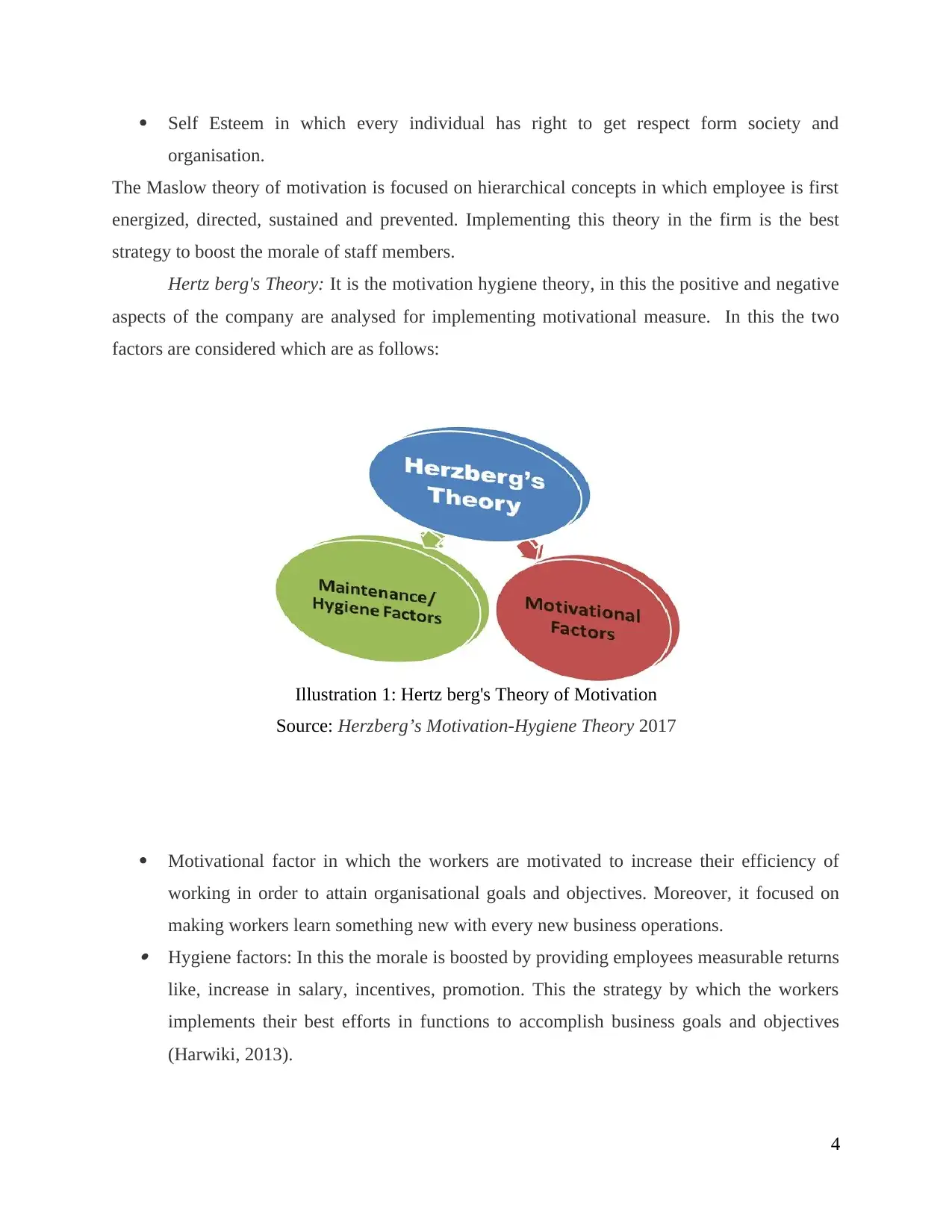
Self Esteem in which every individual has right to get respect form society and
organisation.
The Maslow theory of motivation is focused on hierarchical concepts in which employee is first
energized, directed, sustained and prevented. Implementing this theory in the firm is the best
strategy to boost the morale of staff members.
Hertz berg's Theory: It is the motivation hygiene theory, in this the positive and negative
aspects of the company are analysed for implementing motivational measure. In this the two
factors are considered which are as follows:
Motivational factor in which the workers are motivated to increase their efficiency of
working in order to attain organisational goals and objectives. Moreover, it focused on
making workers learn something new with every new business operations. Hygiene factors: In this the morale is boosted by providing employees measurable returns
like, increase in salary, incentives, promotion. This the strategy by which the workers
implements their best efforts in functions to accomplish business goals and objectives
(Harwiki, 2013).
4
Illustration 1: Hertz berg's Theory of Motivation
Source: Herzberg’s Motivation-Hygiene Theory 2017
organisation.
The Maslow theory of motivation is focused on hierarchical concepts in which employee is first
energized, directed, sustained and prevented. Implementing this theory in the firm is the best
strategy to boost the morale of staff members.
Hertz berg's Theory: It is the motivation hygiene theory, in this the positive and negative
aspects of the company are analysed for implementing motivational measure. In this the two
factors are considered which are as follows:
Motivational factor in which the workers are motivated to increase their efficiency of
working in order to attain organisational goals and objectives. Moreover, it focused on
making workers learn something new with every new business operations. Hygiene factors: In this the morale is boosted by providing employees measurable returns
like, increase in salary, incentives, promotion. This the strategy by which the workers
implements their best efforts in functions to accomplish business goals and objectives
(Harwiki, 2013).
4
Illustration 1: Hertz berg's Theory of Motivation
Source: Herzberg’s Motivation-Hygiene Theory 2017
⊘ This is a preview!⊘
Do you want full access?
Subscribe today to unlock all pages.

Trusted by 1+ million students worldwide
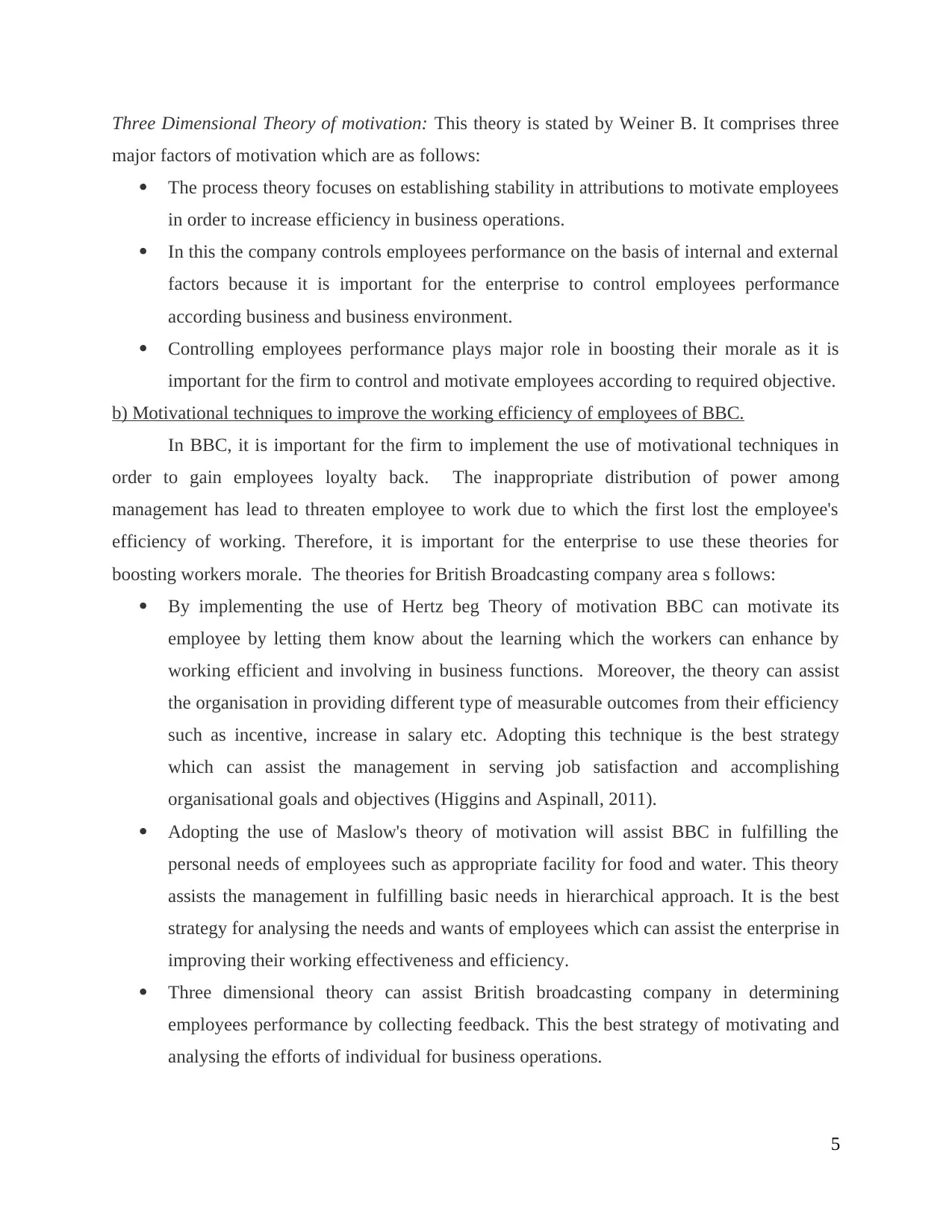
Three Dimensional Theory of motivation: This theory is stated by Weiner B. It comprises three
major factors of motivation which are as follows:
The process theory focuses on establishing stability in attributions to motivate employees
in order to increase efficiency in business operations.
In this the company controls employees performance on the basis of internal and external
factors because it is important for the enterprise to control employees performance
according business and business environment.
Controlling employees performance plays major role in boosting their morale as it is
important for the firm to control and motivate employees according to required objective.
b) Motivational techniques to improve the working efficiency of employees of BBC.
In BBC, it is important for the firm to implement the use of motivational techniques in
order to gain employees loyalty back. The inappropriate distribution of power among
management has lead to threaten employee to work due to which the first lost the employee's
efficiency of working. Therefore, it is important for the enterprise to use these theories for
boosting workers morale. The theories for British Broadcasting company area s follows:
By implementing the use of Hertz beg Theory of motivation BBC can motivate its
employee by letting them know about the learning which the workers can enhance by
working efficient and involving in business functions. Moreover, the theory can assist
the organisation in providing different type of measurable outcomes from their efficiency
such as incentive, increase in salary etc. Adopting this technique is the best strategy
which can assist the management in serving job satisfaction and accomplishing
organisational goals and objectives (Higgins and Aspinall, 2011).
Adopting the use of Maslow's theory of motivation will assist BBC in fulfilling the
personal needs of employees such as appropriate facility for food and water. This theory
assists the management in fulfilling basic needs in hierarchical approach. It is the best
strategy for analysing the needs and wants of employees which can assist the enterprise in
improving their working effectiveness and efficiency.
Three dimensional theory can assist British broadcasting company in determining
employees performance by collecting feedback. This the best strategy of motivating and
analysing the efforts of individual for business operations.
5
major factors of motivation which are as follows:
The process theory focuses on establishing stability in attributions to motivate employees
in order to increase efficiency in business operations.
In this the company controls employees performance on the basis of internal and external
factors because it is important for the enterprise to control employees performance
according business and business environment.
Controlling employees performance plays major role in boosting their morale as it is
important for the firm to control and motivate employees according to required objective.
b) Motivational techniques to improve the working efficiency of employees of BBC.
In BBC, it is important for the firm to implement the use of motivational techniques in
order to gain employees loyalty back. The inappropriate distribution of power among
management has lead to threaten employee to work due to which the first lost the employee's
efficiency of working. Therefore, it is important for the enterprise to use these theories for
boosting workers morale. The theories for British Broadcasting company area s follows:
By implementing the use of Hertz beg Theory of motivation BBC can motivate its
employee by letting them know about the learning which the workers can enhance by
working efficient and involving in business functions. Moreover, the theory can assist
the organisation in providing different type of measurable outcomes from their efficiency
such as incentive, increase in salary etc. Adopting this technique is the best strategy
which can assist the management in serving job satisfaction and accomplishing
organisational goals and objectives (Higgins and Aspinall, 2011).
Adopting the use of Maslow's theory of motivation will assist BBC in fulfilling the
personal needs of employees such as appropriate facility for food and water. This theory
assists the management in fulfilling basic needs in hierarchical approach. It is the best
strategy for analysing the needs and wants of employees which can assist the enterprise in
improving their working effectiveness and efficiency.
Three dimensional theory can assist British broadcasting company in determining
employees performance by collecting feedback. This the best strategy of motivating and
analysing the efforts of individual for business operations.
5
Paraphrase This Document
Need a fresh take? Get an instant paraphrase of this document with our AI Paraphraser
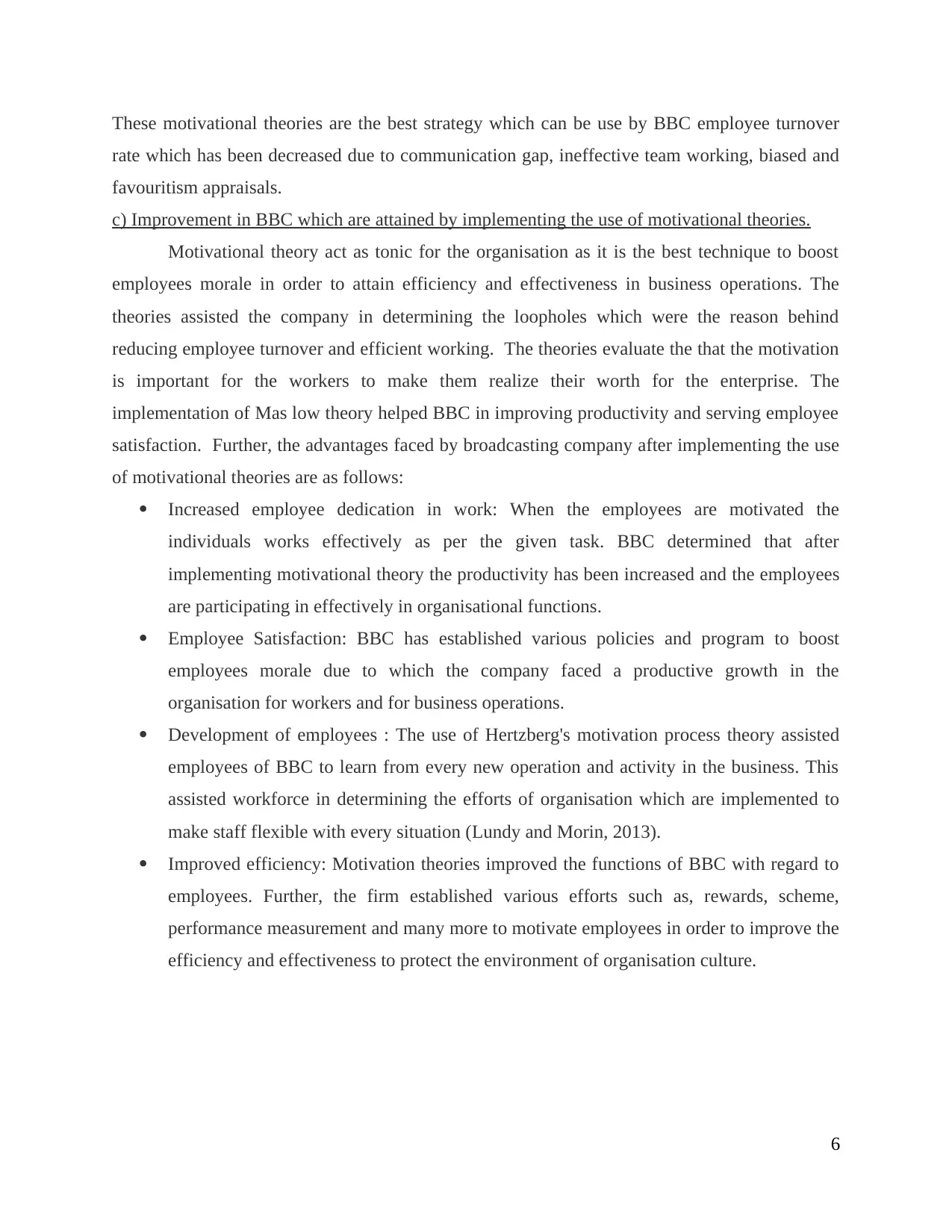
These motivational theories are the best strategy which can be use by BBC employee turnover
rate which has been decreased due to communication gap, ineffective team working, biased and
favouritism appraisals.
c) Improvement in BBC which are attained by implementing the use of motivational theories.
Motivational theory act as tonic for the organisation as it is the best technique to boost
employees morale in order to attain efficiency and effectiveness in business operations. The
theories assisted the company in determining the loopholes which were the reason behind
reducing employee turnover and efficient working. The theories evaluate the that the motivation
is important for the workers to make them realize their worth for the enterprise. The
implementation of Mas low theory helped BBC in improving productivity and serving employee
satisfaction. Further, the advantages faced by broadcasting company after implementing the use
of motivational theories are as follows:
Increased employee dedication in work: When the employees are motivated the
individuals works effectively as per the given task. BBC determined that after
implementing motivational theory the productivity has been increased and the employees
are participating in effectively in organisational functions.
Employee Satisfaction: BBC has established various policies and program to boost
employees morale due to which the company faced a productive growth in the
organisation for workers and for business operations.
Development of employees : The use of Hertzberg's motivation process theory assisted
employees of BBC to learn from every new operation and activity in the business. This
assisted workforce in determining the efforts of organisation which are implemented to
make staff flexible with every situation (Lundy and Morin, 2013).
Improved efficiency: Motivation theories improved the functions of BBC with regard to
employees. Further, the firm established various efforts such as, rewards, scheme,
performance measurement and many more to motivate employees in order to improve the
efficiency and effectiveness to protect the environment of organisation culture.
6
rate which has been decreased due to communication gap, ineffective team working, biased and
favouritism appraisals.
c) Improvement in BBC which are attained by implementing the use of motivational theories.
Motivational theory act as tonic for the organisation as it is the best technique to boost
employees morale in order to attain efficiency and effectiveness in business operations. The
theories assisted the company in determining the loopholes which were the reason behind
reducing employee turnover and efficient working. The theories evaluate the that the motivation
is important for the workers to make them realize their worth for the enterprise. The
implementation of Mas low theory helped BBC in improving productivity and serving employee
satisfaction. Further, the advantages faced by broadcasting company after implementing the use
of motivational theories are as follows:
Increased employee dedication in work: When the employees are motivated the
individuals works effectively as per the given task. BBC determined that after
implementing motivational theory the productivity has been increased and the employees
are participating in effectively in organisational functions.
Employee Satisfaction: BBC has established various policies and program to boost
employees morale due to which the company faced a productive growth in the
organisation for workers and for business operations.
Development of employees : The use of Hertzberg's motivation process theory assisted
employees of BBC to learn from every new operation and activity in the business. This
assisted workforce in determining the efforts of organisation which are implemented to
make staff flexible with every situation (Lundy and Morin, 2013).
Improved efficiency: Motivation theories improved the functions of BBC with regard to
employees. Further, the firm established various efforts such as, rewards, scheme,
performance measurement and many more to motivate employees in order to improve the
efficiency and effectiveness to protect the environment of organisation culture.
6
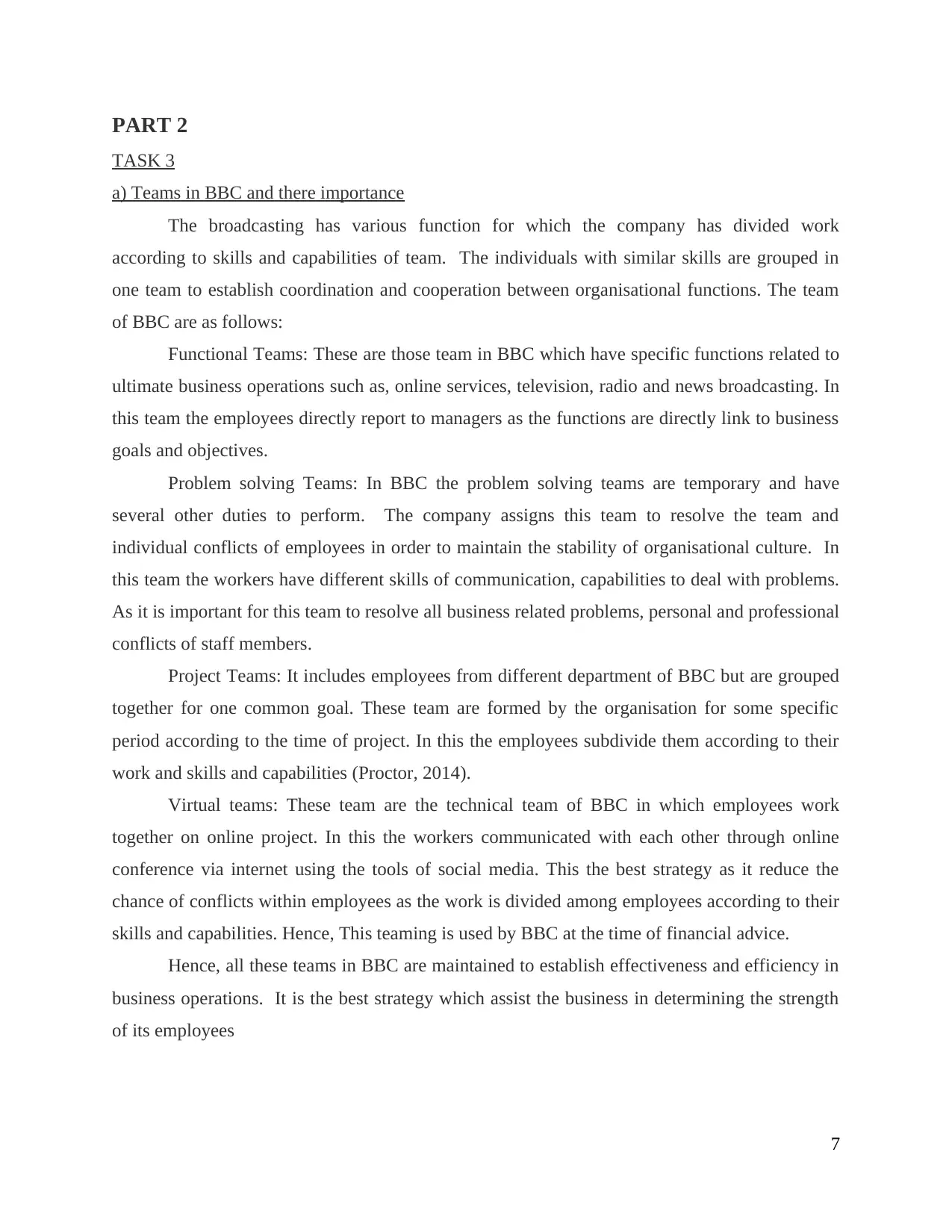
PART 2
TASK 3
a) Teams in BBC and there importance
The broadcasting has various function for which the company has divided work
according to skills and capabilities of team. The individuals with similar skills are grouped in
one team to establish coordination and cooperation between organisational functions. The team
of BBC are as follows:
Functional Teams: These are those team in BBC which have specific functions related to
ultimate business operations such as, online services, television, radio and news broadcasting. In
this team the employees directly report to managers as the functions are directly link to business
goals and objectives.
Problem solving Teams: In BBC the problem solving teams are temporary and have
several other duties to perform. The company assigns this team to resolve the team and
individual conflicts of employees in order to maintain the stability of organisational culture. In
this team the workers have different skills of communication, capabilities to deal with problems.
As it is important for this team to resolve all business related problems, personal and professional
conflicts of staff members.
Project Teams: It includes employees from different department of BBC but are grouped
together for one common goal. These team are formed by the organisation for some specific
period according to the time of project. In this the employees subdivide them according to their
work and skills and capabilities (Proctor, 2014).
Virtual teams: These team are the technical team of BBC in which employees work
together on online project. In this the workers communicated with each other through online
conference via internet using the tools of social media. This the best strategy as it reduce the
chance of conflicts within employees as the work is divided among employees according to their
skills and capabilities. Hence, This teaming is used by BBC at the time of financial advice.
Hence, all these teams in BBC are maintained to establish effectiveness and efficiency in
business operations. It is the best strategy which assist the business in determining the strength
of its employees
7
TASK 3
a) Teams in BBC and there importance
The broadcasting has various function for which the company has divided work
according to skills and capabilities of team. The individuals with similar skills are grouped in
one team to establish coordination and cooperation between organisational functions. The team
of BBC are as follows:
Functional Teams: These are those team in BBC which have specific functions related to
ultimate business operations such as, online services, television, radio and news broadcasting. In
this team the employees directly report to managers as the functions are directly link to business
goals and objectives.
Problem solving Teams: In BBC the problem solving teams are temporary and have
several other duties to perform. The company assigns this team to resolve the team and
individual conflicts of employees in order to maintain the stability of organisational culture. In
this team the workers have different skills of communication, capabilities to deal with problems.
As it is important for this team to resolve all business related problems, personal and professional
conflicts of staff members.
Project Teams: It includes employees from different department of BBC but are grouped
together for one common goal. These team are formed by the organisation for some specific
period according to the time of project. In this the employees subdivide them according to their
work and skills and capabilities (Proctor, 2014).
Virtual teams: These team are the technical team of BBC in which employees work
together on online project. In this the workers communicated with each other through online
conference via internet using the tools of social media. This the best strategy as it reduce the
chance of conflicts within employees as the work is divided among employees according to their
skills and capabilities. Hence, This teaming is used by BBC at the time of financial advice.
Hence, all these teams in BBC are maintained to establish effectiveness and efficiency in
business operations. It is the best strategy which assist the business in determining the strength
of its employees
7
⊘ This is a preview!⊘
Do you want full access?
Subscribe today to unlock all pages.

Trusted by 1+ million students worldwide
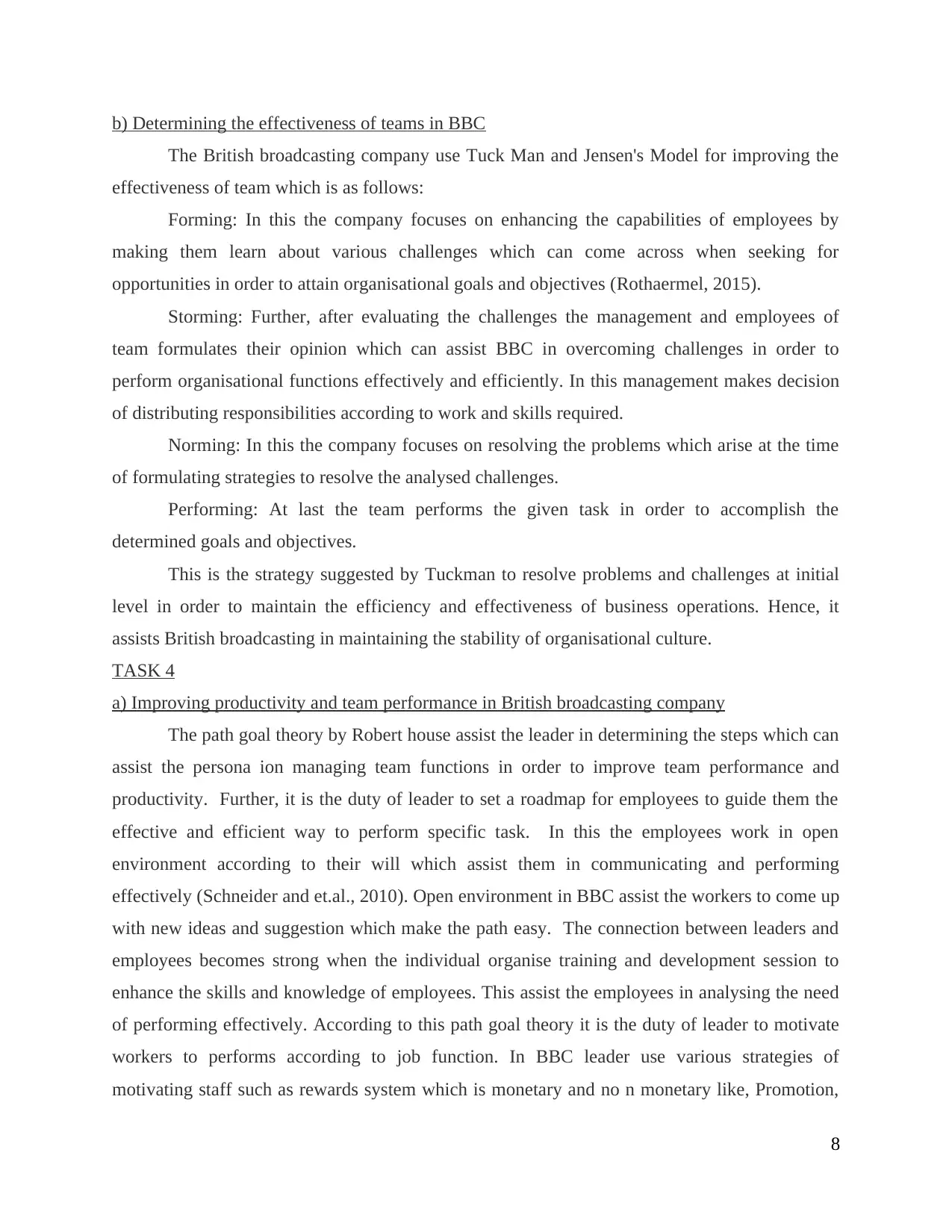
b) Determining the effectiveness of teams in BBC
The British broadcasting company use Tuck Man and Jensen's Model for improving the
effectiveness of team which is as follows:
Forming: In this the company focuses on enhancing the capabilities of employees by
making them learn about various challenges which can come across when seeking for
opportunities in order to attain organisational goals and objectives (Rothaermel, 2015).
Storming: Further, after evaluating the challenges the management and employees of
team formulates their opinion which can assist BBC in overcoming challenges in order to
perform organisational functions effectively and efficiently. In this management makes decision
of distributing responsibilities according to work and skills required.
Norming: In this the company focuses on resolving the problems which arise at the time
of formulating strategies to resolve the analysed challenges.
Performing: At last the team performs the given task in order to accomplish the
determined goals and objectives.
This is the strategy suggested by Tuckman to resolve problems and challenges at initial
level in order to maintain the efficiency and effectiveness of business operations. Hence, it
assists British broadcasting in maintaining the stability of organisational culture.
TASK 4
a) Improving productivity and team performance in British broadcasting company
The path goal theory by Robert house assist the leader in determining the steps which can
assist the persona ion managing team functions in order to improve team performance and
productivity. Further, it is the duty of leader to set a roadmap for employees to guide them the
effective and efficient way to perform specific task. In this the employees work in open
environment according to their will which assist them in communicating and performing
effectively (Schneider and et.al., 2010). Open environment in BBC assist the workers to come up
with new ideas and suggestion which make the path easy. The connection between leaders and
employees becomes strong when the individual organise training and development session to
enhance the skills and knowledge of employees. This assist the employees in analysing the need
of performing effectively. According to this path goal theory it is the duty of leader to motivate
workers to performs according to job function. In BBC leader use various strategies of
motivating staff such as rewards system which is monetary and no n monetary like, Promotion,
8
The British broadcasting company use Tuck Man and Jensen's Model for improving the
effectiveness of team which is as follows:
Forming: In this the company focuses on enhancing the capabilities of employees by
making them learn about various challenges which can come across when seeking for
opportunities in order to attain organisational goals and objectives (Rothaermel, 2015).
Storming: Further, after evaluating the challenges the management and employees of
team formulates their opinion which can assist BBC in overcoming challenges in order to
perform organisational functions effectively and efficiently. In this management makes decision
of distributing responsibilities according to work and skills required.
Norming: In this the company focuses on resolving the problems which arise at the time
of formulating strategies to resolve the analysed challenges.
Performing: At last the team performs the given task in order to accomplish the
determined goals and objectives.
This is the strategy suggested by Tuckman to resolve problems and challenges at initial
level in order to maintain the efficiency and effectiveness of business operations. Hence, it
assists British broadcasting in maintaining the stability of organisational culture.
TASK 4
a) Improving productivity and team performance in British broadcasting company
The path goal theory by Robert house assist the leader in determining the steps which can
assist the persona ion managing team functions in order to improve team performance and
productivity. Further, it is the duty of leader to set a roadmap for employees to guide them the
effective and efficient way to perform specific task. In this the employees work in open
environment according to their will which assist them in communicating and performing
effectively (Schneider and et.al., 2010). Open environment in BBC assist the workers to come up
with new ideas and suggestion which make the path easy. The connection between leaders and
employees becomes strong when the individual organise training and development session to
enhance the skills and knowledge of employees. This assist the employees in analysing the need
of performing effectively. According to this path goal theory it is the duty of leader to motivate
workers to performs according to job function. In BBC leader use various strategies of
motivating staff such as rewards system which is monetary and no n monetary like, Promotion,
8
Paraphrase This Document
Need a fresh take? Get an instant paraphrase of this document with our AI Paraphraser
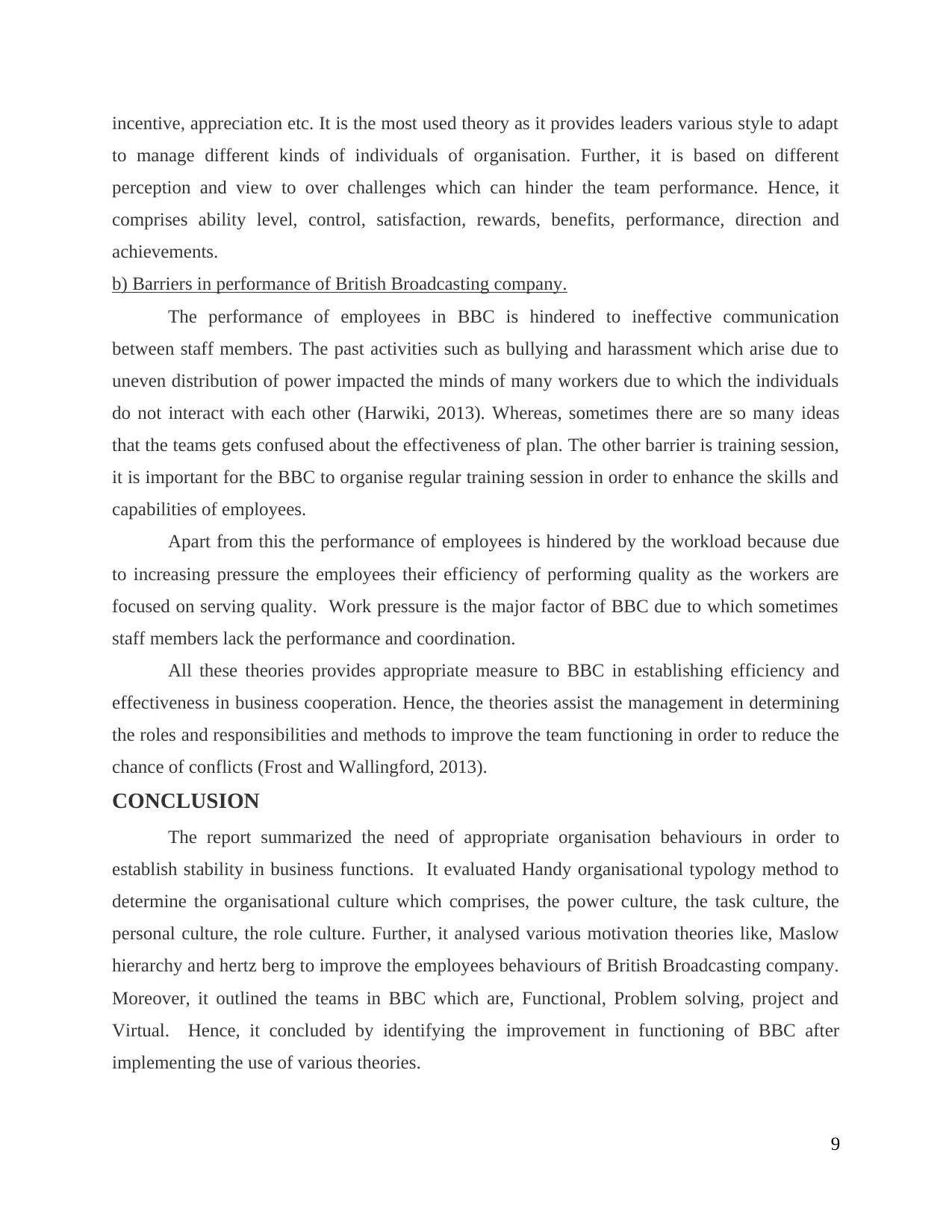
incentive, appreciation etc. It is the most used theory as it provides leaders various style to adapt
to manage different kinds of individuals of organisation. Further, it is based on different
perception and view to over challenges which can hinder the team performance. Hence, it
comprises ability level, control, satisfaction, rewards, benefits, performance, direction and
achievements.
b) Barriers in performance of British Broadcasting company.
The performance of employees in BBC is hindered to ineffective communication
between staff members. The past activities such as bullying and harassment which arise due to
uneven distribution of power impacted the minds of many workers due to which the individuals
do not interact with each other (Harwiki, 2013). Whereas, sometimes there are so many ideas
that the teams gets confused about the effectiveness of plan. The other barrier is training session,
it is important for the BBC to organise regular training session in order to enhance the skills and
capabilities of employees.
Apart from this the performance of employees is hindered by the workload because due
to increasing pressure the employees their efficiency of performing quality as the workers are
focused on serving quality. Work pressure is the major factor of BBC due to which sometimes
staff members lack the performance and coordination.
All these theories provides appropriate measure to BBC in establishing efficiency and
effectiveness in business cooperation. Hence, the theories assist the management in determining
the roles and responsibilities and methods to improve the team functioning in order to reduce the
chance of conflicts (Frost and Wallingford, 2013).
CONCLUSION
The report summarized the need of appropriate organisation behaviours in order to
establish stability in business functions. It evaluated Handy organisational typology method to
determine the organisational culture which comprises, the power culture, the task culture, the
personal culture, the role culture. Further, it analysed various motivation theories like, Maslow
hierarchy and hertz berg to improve the employees behaviours of British Broadcasting company.
Moreover, it outlined the teams in BBC which are, Functional, Problem solving, project and
Virtual. Hence, it concluded by identifying the improvement in functioning of BBC after
implementing the use of various theories.
9
to manage different kinds of individuals of organisation. Further, it is based on different
perception and view to over challenges which can hinder the team performance. Hence, it
comprises ability level, control, satisfaction, rewards, benefits, performance, direction and
achievements.
b) Barriers in performance of British Broadcasting company.
The performance of employees in BBC is hindered to ineffective communication
between staff members. The past activities such as bullying and harassment which arise due to
uneven distribution of power impacted the minds of many workers due to which the individuals
do not interact with each other (Harwiki, 2013). Whereas, sometimes there are so many ideas
that the teams gets confused about the effectiveness of plan. The other barrier is training session,
it is important for the BBC to organise regular training session in order to enhance the skills and
capabilities of employees.
Apart from this the performance of employees is hindered by the workload because due
to increasing pressure the employees their efficiency of performing quality as the workers are
focused on serving quality. Work pressure is the major factor of BBC due to which sometimes
staff members lack the performance and coordination.
All these theories provides appropriate measure to BBC in establishing efficiency and
effectiveness in business cooperation. Hence, the theories assist the management in determining
the roles and responsibilities and methods to improve the team functioning in order to reduce the
chance of conflicts (Frost and Wallingford, 2013).
CONCLUSION
The report summarized the need of appropriate organisation behaviours in order to
establish stability in business functions. It evaluated Handy organisational typology method to
determine the organisational culture which comprises, the power culture, the task culture, the
personal culture, the role culture. Further, it analysed various motivation theories like, Maslow
hierarchy and hertz berg to improve the employees behaviours of British Broadcasting company.
Moreover, it outlined the teams in BBC which are, Functional, Problem solving, project and
Virtual. Hence, it concluded by identifying the improvement in functioning of BBC after
implementing the use of various theories.
9
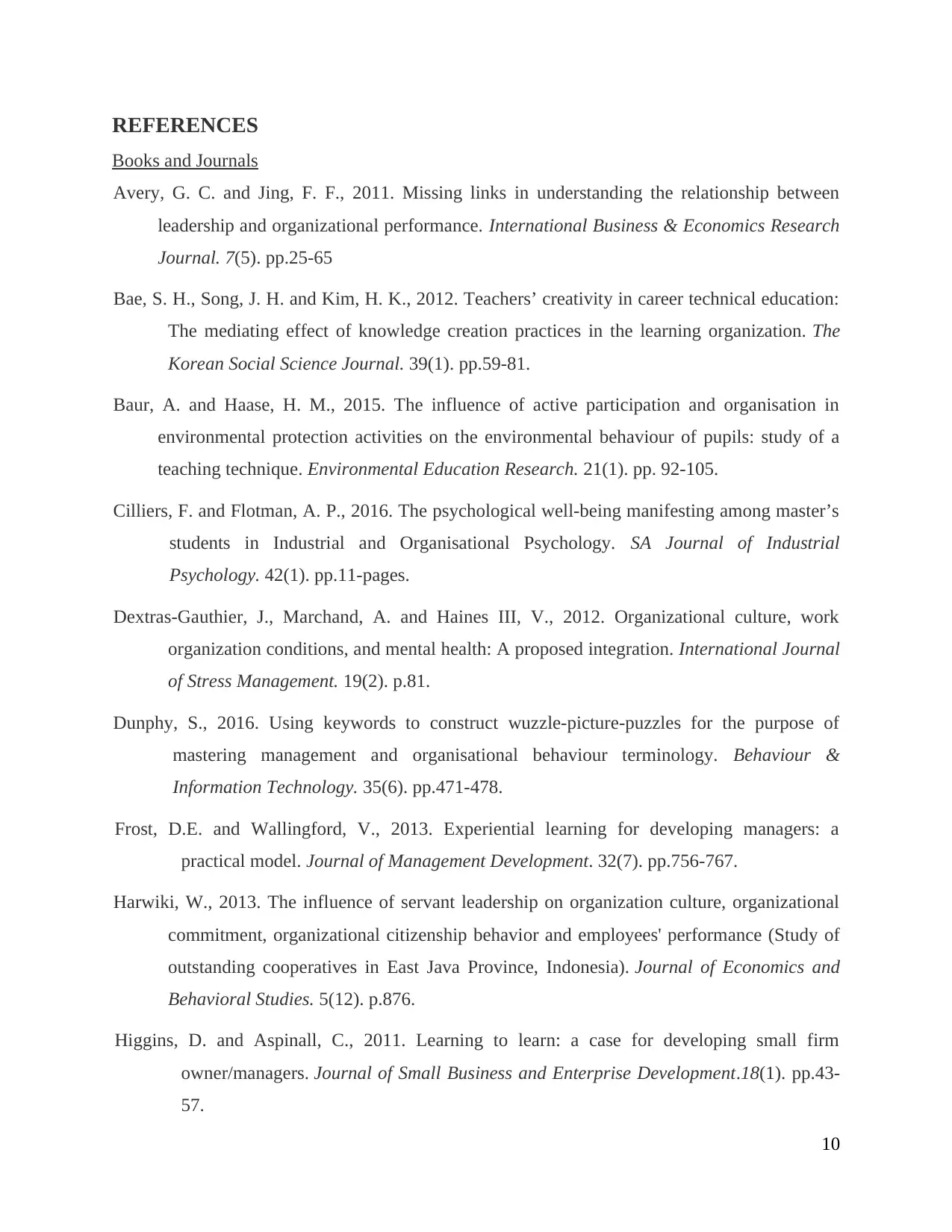
REFERENCES
Books and Journals
Avery, G. C. and Jing, F. F., 2011. Missing links in understanding the relationship between
leadership and organizational performance. International Business & Economics Research
Journal. 7(5). pp.25-65
Bae, S. H., Song, J. H. and Kim, H. K., 2012. Teachers’ creativity in career technical education:
The mediating effect of knowledge creation practices in the learning organization. The
Korean Social Science Journal. 39(1). pp.59-81.
Baur, A. and Haase, H. M., 2015. The influence of active participation and organisation in
environmental protection activities on the environmental behaviour of pupils: study of a
teaching technique. Environmental Education Research. 21(1). pp. 92-105.
Cilliers, F. and Flotman, A. P., 2016. The psychological well-being manifesting among master’s
students in Industrial and Organisational Psychology. SA Journal of Industrial
Psychology. 42(1). pp.11-pages.
Dextras-Gauthier, J., Marchand, A. and Haines III, V., 2012. Organizational culture, work
organization conditions, and mental health: A proposed integration. International Journal
of Stress Management. 19(2). p.81.
Dunphy, S., 2016. Using keywords to construct wuzzle-picture-puzzles for the purpose of
mastering management and organisational behaviour terminology. Behaviour &
Information Technology. 35(6). pp.471-478.
Frost, D.E. and Wallingford, V., 2013. Experiential learning for developing managers: a
practical model. Journal of Management Development. 32(7). pp.756-767.
Harwiki, W., 2013. The influence of servant leadership on organization culture, organizational
commitment, organizational citizenship behavior and employees' performance (Study of
outstanding cooperatives in East Java Province, Indonesia). Journal of Economics and
Behavioral Studies. 5(12). p.876.
Higgins, D. and Aspinall, C., 2011. Learning to learn: a case for developing small firm
owner/managers. Journal of Small Business and Enterprise Development.18(1). pp.43-
57.
10
Books and Journals
Avery, G. C. and Jing, F. F., 2011. Missing links in understanding the relationship between
leadership and organizational performance. International Business & Economics Research
Journal. 7(5). pp.25-65
Bae, S. H., Song, J. H. and Kim, H. K., 2012. Teachers’ creativity in career technical education:
The mediating effect of knowledge creation practices in the learning organization. The
Korean Social Science Journal. 39(1). pp.59-81.
Baur, A. and Haase, H. M., 2015. The influence of active participation and organisation in
environmental protection activities on the environmental behaviour of pupils: study of a
teaching technique. Environmental Education Research. 21(1). pp. 92-105.
Cilliers, F. and Flotman, A. P., 2016. The psychological well-being manifesting among master’s
students in Industrial and Organisational Psychology. SA Journal of Industrial
Psychology. 42(1). pp.11-pages.
Dextras-Gauthier, J., Marchand, A. and Haines III, V., 2012. Organizational culture, work
organization conditions, and mental health: A proposed integration. International Journal
of Stress Management. 19(2). p.81.
Dunphy, S., 2016. Using keywords to construct wuzzle-picture-puzzles for the purpose of
mastering management and organisational behaviour terminology. Behaviour &
Information Technology. 35(6). pp.471-478.
Frost, D.E. and Wallingford, V., 2013. Experiential learning for developing managers: a
practical model. Journal of Management Development. 32(7). pp.756-767.
Harwiki, W., 2013. The influence of servant leadership on organization culture, organizational
commitment, organizational citizenship behavior and employees' performance (Study of
outstanding cooperatives in East Java Province, Indonesia). Journal of Economics and
Behavioral Studies. 5(12). p.876.
Higgins, D. and Aspinall, C., 2011. Learning to learn: a case for developing small firm
owner/managers. Journal of Small Business and Enterprise Development.18(1). pp.43-
57.
10
⊘ This is a preview!⊘
Do you want full access?
Subscribe today to unlock all pages.

Trusted by 1+ million students worldwide
1 out of 13
Related Documents
Your All-in-One AI-Powered Toolkit for Academic Success.
+13062052269
info@desklib.com
Available 24*7 on WhatsApp / Email
![[object Object]](/_next/static/media/star-bottom.7253800d.svg)
Unlock your academic potential
Copyright © 2020–2025 A2Z Services. All Rights Reserved. Developed and managed by ZUCOL.





